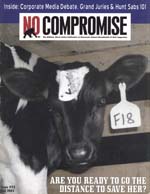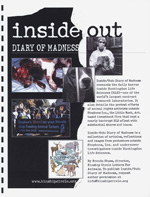The Archives
-
No Compromise, Periodicals
No Compromise #20-22
11.15.12 | PermalinkNo Compromise #20-22 (2003. Santa Cruz / San Francisco, CA)
No Comp scored another great year in 2003, this time by going deeper into practical instructions for campaigning, and also by examining the smaller stories in greater detail. While the high profile victories of anti-HLS activists were given their due, inspirational figures who had passed on were also given touching coverage. Issue #20 features articles on early Band of Mercy and Animal Liberation Front founder Sue Smith, and Sweden’s animal lib die-hard, Ake Soderlund. Similar examinations of our past, and the courageous figures whose shoulders we stand upon, pepper the 2003 issues. Of particular note is the article on Henry Hutto in issue #21.
2003 was also the year that Rod Coronado finally got off of probation and was allowed to participate in the movement again. His writings for No Compromise were as subversive and inspiring as ever, and it is easy to see why the government considered him such a threat.
As the year progressed No Comp moved to a magazine format and tightened their graphic design skills in response to Jake Conroy’s work on the SHAC USA newsletter. These glossy issues were excellent contributions to the movement, and it is a shame that in only a few more years NC would cease to exist altogether. These information (and inspiration!) packed issues are worth reading again to inform and encourage our current actions.



-
One-off publications
Inside / Out: Diary of Madness
05.08.12 | PermalinkInside / Out: Diary of Madness (2001, St. Louis, MO)
Back when the United States still had a strong grassroots animal liberation infrastructure, activists would regularly travel from all across the country to attend national demonstrations. Hundreds, or even thousands, of people would descend on various targets, and for a few days at least, bring the killers a little taste of the hell that they regularly created for non-humans.
Inside / Out is the story of Brenda Shoss’ experience at one such demonstration which took place in Little Rock between October 27th and 29th in 2001. Brenda, a devoted animal rescuer and mother, represented the broad diversity of the campaign against Huntingdon Life Sciences during it’s early years. Hailing from St. Louis, she hardly fit the image of “the usual suspects” in militant campaigning. Happily marching alongside pierced punks and anarchists, Brenda’s mild mannered and patriotic politics did not clash with those held by her comrades: instead her presence signaled a movement able to break through to a wider audience. Throughout her account of the demonstrations she evokes the anger and outrage that prompted thousands to band together, despite their differences, to fight to shut down HLS.
Following her personal reflections on the demonstration and overall campaign are excerpts from Michelle Rokke’s “Diaries of Despair,” an insider’s account of the horrors that happen behind the locked doors of Huntingdon, a company that continues to kill hundreds of animals a day in unnecessary and vicious experiments.





